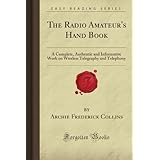
Average Reviews:

(More customer reviews)This is a very nicely produced republication of the 1922 Collins (no, not THAT Collins) Radio Amateur's Hand Book (no, not THAT Handbook). The original text was scanned and printed in a good modern font. The figures, however, were not redrawn, so they are a little fuzzy.
Forgotten Books makes this book available on-line for free browsing (but not downloading), or you can buy the hardcopy from Amazon. I recommend the hardcopy for easy reading. (Numerous other versions are available on-line, but many do not contain the illustrations, which are critical in this book.)
After publication of the 1922 revision, there was a review in QST that took the author to task for presenting various obsolete circuits and techniques, even by 1923 standards. For us in 2009, however, it is fascinating to read the details about how to construct spark gap and vacuum tube (CW) transmitters and their corresponding receivers, even though the historical progression is not thoroughly explained.
This is a book that belongs on every ham operator's history shelf.
Click Here to see more reviews about: The Radio Amateur's Hand Book: A Complete, Authentic and Informative Work on Wireless Telegraphy and Telephony (Forgotten Books)
Amateur radio, often called ham radio, is both a hobby and a service in which participants, called "hams," use various types of radio communications equipment to communicate with other radio amateurs for public service, recreation and self-training.Amateur radio operators enjoy personal wireless communications with each other and are able to support their communities with emergency and disaster communications if necessary, while increasing their personal knowledge of electronics and radio theory. An estimated six million people throughout the world are regularly involved with amateur radio.The term "amateur" is not a reflection on the skills of the participants, which are often quite advanced; rather, "amateur" indicates that amateur radio communications are not allowed to be made for commercial or money-making purposes. (Quote from wikipedia.org)About the AuthorGeorge Bernard Shaw (1856 - 1950)George Bernard Shaw (26 July 1856 - 2 November 1950) was a world-famous Irish playwright. Born in Dublin, he moved to London at the age of twenty and lived in England for the remainder of his life. Shaw's first profitable writing was music and literary criticism, but he had a bent for drama: during his career he authored more than sixty plays. Nearly all of his writings dealt sternly with prevailing social problems, but are nicely leavened by a vein of comedy to make their stark themes more palatable. He pondered education, marriage, religion, government, health care, and class privilege and found them all defective, but his ire was most aroused by the exploitation of the working class by heartless employers; his writings seldom fail to censure that abuse.An ardent socialist, Shaw wrote many brochures and speeches for the Fabian Soc

0 comments:
Post a Comment